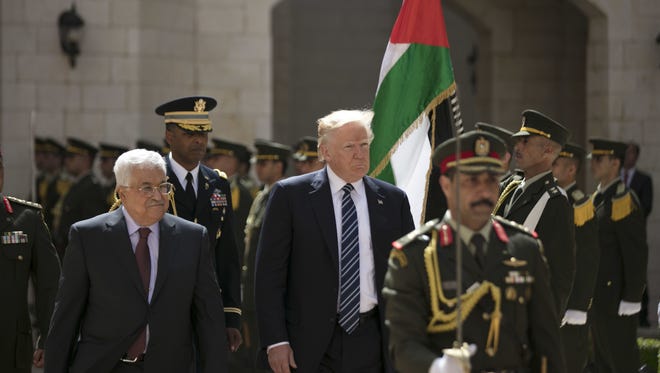Despite Trump's hopefulness, few signs of progress on Middle East peace

JERUSALEM — President Trump said Tuesday that both Israel and Palestine are ready to "reach for peace" in their decades-long conflict, and that he is personally committed to achieving what he calls "the ultimate deal."
But after a 28-hour stop in Israel that included separate meetings with Israeli and Palestinian leaders, Trump left Jerusalem without putting forward any specific proposals, road maps or next steps for that peace to happen. He sidestepped the issue of Israeli settlements in Palestinian territory, something he and President Obama have both said are unhelpful to the peace process.
And Trump also left one of his campaign promises — a pledge to move the U.S. Embassy from Tel Aviv to Jerusalem — unfulfilled.
Despite the professed optimism for prospects for a peace accord, there were signs even during Trump’s visit that deep divisions remain between the two sides.
Even Trump's schedule betrayed the difficulty in bringing the two sides together. Unable to bring Israeli and Palestinian leaders to the same table, he gave warm greetings to Israeli Prime Minister Benjamin Netanyahu during their frequent public appearances together.
U.S. federal law prohibits the Trump administration from negotiating with the Palestinian Authority in Jerusalem, which might lend legitimacy to its claim on the city as its capital. After taking his motorcade some six miles to Bethlehem to meet with Palestinian President Mahmoud Abbas, Trump stood stone-faced while Abbas called him "your excellency" and repeated his negotiating points.
Abbas drew Trump's attention to a protest camp at the Church of the Nativity in solidarity with Palestinian prisoners on a hunger strike. "Their demands are humane and just," he said.
"Our fundamental problem is with the occupation and settlements, and failure of Israel to recognize the state of Palestine in the same way we recognize it, which undermines the realization of the two-state solution," Abbas complained. "The problem is not between us and Judaism. It’s between us and occupation."
But Trump, who signed an agreement with Arab leaders to crack down on financial support for terrorism at a summit in Saudi Arabia Sunday, suggested that Abbas needs to take a harder line on the so-called Martyrs Fund that provides payments to families of Palestinians killed or imprisoned for attacking Israelis.
"It's so interesting that our meeting took place on this very horrible morning of death to innocent young people," Trump said, referring to the concert bombing in Manchester. "Peace can never take root in an environment where violence is tolerated, funded and even rewarded."
Later, introducing Trump at an appearance at the Israel Museum, Netanyahu made that same point more directly, as the death toll from the suicide bombing at an Ariana Grande concert in Manchester climbed to 22 and the Islamic State claimed responsibility.
"I hope this heralds a real change, because if the (Manchester) attacker had been Palestinian and the victims had been Israeli children, the suicide bomber's family would have received a stipend from the Palestinian authority," he said. "That's Palestinian law. That law must be changed."
Every president since Richard Nixon has tried to bring about a permanent peace agreement between Israel and Palestine, but Trump's attempts have been particularly ambitious for a first-term president struggling to get significant legislation passed at home and already dealing with multiple foreign policy crises, including war in Syria, North Korea’s latest provocations, and threats from the Islamic State.
Applying his experience in real estate transactions to international diplomacy, he's put son-in-law Jared Kushner in charge of the effort, and told Abbas earlier this month that an agreement was "frankly maybe not as difficult as people have thought."
But on Tuesday, he seemed no further along than he was when he arrived.
"We know that peace is possible if we put aside the pain and disagreements of the past and commit together to finally resolving this crisis, which has dragged on for nearly half a century or more," he said. "With determination, compromise, and the belief that peace is possible, Israelis and Palestinians can make a deal."
A senior administration official, speaking to reporters under condition of anonymity, appeared to tamp down expectations of immediate progress on a peace accord. “You can’t just walk in on Day One and sign a deal that no one has gotten done in 35 years," the official said, according to a pool report. "But we thought it was very essential to look at the work over the last 100-odd days and this trip is to do a lot of listening, build very strong relationships with all the different people, not just the parties involved, but all the people in the neighborhood. And also try to create a lot of momentum and optimism around the prospect for peace.”
Trump's speech at the Israel Museum lacked the sweeping doctrinal statements of his speech in Saudi Arabia, in which he moved to align the United States with the Islamic world in a common fight against extremism by the Islamic State and Iran.
He repeated his pledge to "always stand with Israel," through support at the United Nations and contributions of advanced military equipment. He said threats to the Israeli State and the Jewish people come not just from rockets fired from Palestinian territories but from the Islamic State and Iran.
"ISIS targets Jewish neighborhoods, synagogues, and storefronts. And Iran’s leaders routinely call for Israel’s destruction," he said. "Not with Donald J. Trump, believe me."
Basking in sustained applause, Trump replied, "Thank you. I like you too."